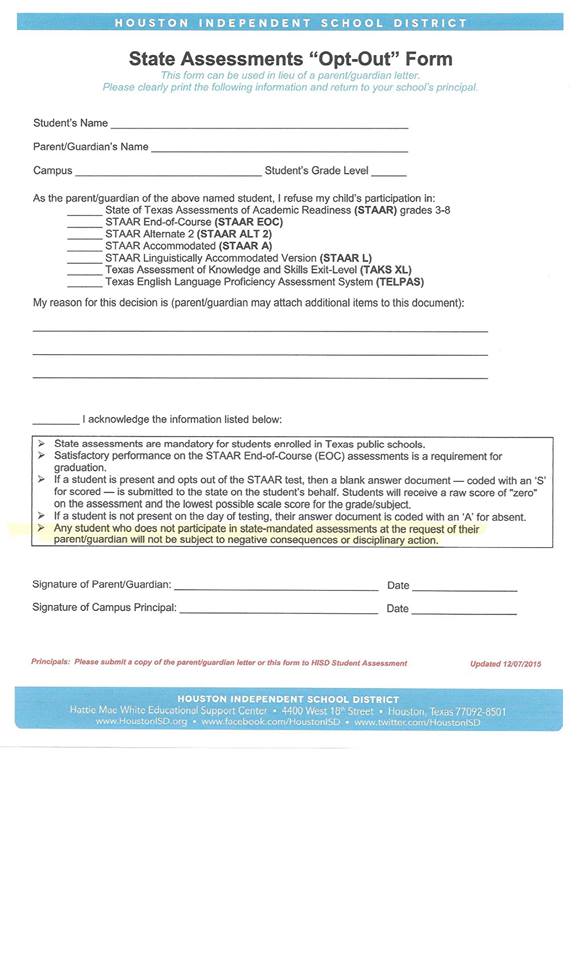How to Opt Out/Decline/Refuse STAAR
January 2024 Update: This article has been updated to reflect the practice of the TEA which permits schools to accept parental refusals without placing the assessment in front of the student.
In response to a lot of “how do I do this” questions, we’ve put together this step by step guide on opting out. This is a general guide of the various steps and forms a parent can follow to Opt Out of the STAAR assessment. If you are looking for an easy, non-confrontational approach, we can’t offer you that. Schools have been instructed to state that they can’t permit it. Some schools go further and falsely claim that state or federal law requires all students to take the STAAR assessments. Others even make implicit or overt threats to parents.
So while all of our forms and letters are polite and civil, there is no guarantee that your school district will work with you. Fortunately, the past few years have brought more cooperation and the chances for a better outcome are greater than ever. But if you are met with resistance, you still hold the power. As Peggy Robertson of United Opt Out said, opting out is, at its heart, an act of civil disobedience. So join the hundreds and thousands of parents locally, statewide and nationally who are standing up and speaking out against the standardization of our children’s education.
STEP ONE:
Inform the school that you intend to opt out of the assessment. You are not asking them to let you. You are telling them your decision. You can use the Master Opt Out letter, and customize it to your needs.
A lot of parents have asked whether you must tell the school. If you simply intend to refuse the assessment, you do not. However, if you want to preserve the argument that Texas law permits you to Opt Out, you must give notice as described in the Opt Out letters. We also encourage notice so that the school understands that the assessment system is being protested by the parents.
STEP TWO:
It is extremely unlikely you will receive a response from the school indicating that your child will not be administered the STAAR. You will almost certainly receive a response from the school telling you they can’t permit it. At that time you can send either the response letter (if they are citing legalities) or a follow up refusal letter (if they simply say they can’t allow it). In that case, go to STEP THREE.
Some schools have taken to simply acknowledging the letter which leaves the parent in a bit of limbo. They acknowledge they received the letter but they don’t tell you what they are going to do. We take this as an opportunity to explore the refusal option. If you get one of these non-committal acknowledgements, we recommend you send a facilitated refusal request (form forthcoming).
If the facilitated refusal request is agreed to, you simply need to follow up and iron out the details (will you stay home on the main administration day, if not where will she go, do they need you or her to sign anything, etc). You may get emailed with the list of “consequences” for refusing. Now is not the time to engage that list. Now is the time to get a refusal set up. You can simply acknowledge that you understand what they have communicated to you. If your request for a facilitated refusal is granted, continue to STEP FIVE. Otherwise go to STEP THREE.
STEP THREE:
At this point, unless the school relents, you will need to make a decision. The choices of the parent here are multiple:
(A) Keep your child home on STAAR days. If you choose (A), you must be aware of not only the primary test days, but the full testing window. Schools may assess students after the main STAAR administration day as long as it is within the window. Testing windows may be found here. (2023-2024 Calendar, as TEA appears to have made its calendar page private!!) Now a school is not REQUIRED to use the full testing window, but they can. Unless you learn that they school has completed all assessments and returned the testing materials to the state, then you should assume the entire window might be used. NOTE: the assessment windows are very long now, and it may be difficult to completely stay out of all assessment days.
(B) Send them for the assessment and instruct them to page to the end without answering any questions, submit it and confirm their submission. This is a far easier option than refusing a paper administration ever was. This is because the assessment can be submitted blank without ever interacting with the proctor. Although some schools are adding steps of telling students to raise their hands before submitting, that is not a requirement. Instruct your student to just submit it when they get to the end, being careful not to answer any questions along the way. If you choose (B) be aware the some schools have told children during testing that their parents just called and said it was OK to take the assessment. Should you go this route, create a password that the child must hear before they take the assessment. If the teacher can’t repeat it, the child doesn’t take the assessment. Refusing in this manner can be done without any notice to the school at all, although we strongly urge parents to make a written record of their protest.
(C) Keep your kid home the main day of STAAR and then return and refuse the assessment on the makeup day. Some school districts have permitted children to return to class on makeup days without being assessed. They have required that the child and parent come together to the office before school and write “refused” on the assessment (or sign some other indicator). This is a common sense approach to a refusal to test. It keeps the child in class, minimizes absences and meets their requirements. You can request Return to Class on Makeup Days using this letter.
(D) Advocate for the school to accept your refusal. This option has become available to parents over the last few years since the TEA has made clear that schools may accept a parental refusal. Before this, the position of the school was always that “if the student is on campus, we are required to put the assessment in front of them.” This led to numerous situations where devious test administrators lied to students, cajoled them to disobey their parents or otherwise pressured students who had been told to refuse to participate instead. The TEA has made clear that this is not required and that the school may accept the parental refusal and simply submit the assessment for scoring as if the student refused in person. Review this article on the parental refusal.
I want to be super clear – no matter what approach you take, you must prepare for the possibility that the school will try to pull your child for assessment. No matter what they have said or how much you trust them — BE PREPARED. Let your child know not to take it. Tell the kid to call you if they pull him for STAAR. Walk in with them. Set up a password system. Have them trained to tab through if they get stuck in an assessment room! It’s sad but every year parents send their kids back to school thinking their opt out will be honored, and the school pulls the kid who is unprepared and caves in and takes the assessment. That’s on us as parents. BE PREPARED! Hope for the best; prepare for the worst. Be one of the many success stories, not the surprise and disappointed victim of school bullying.
STEP FOUR:
This step used to talk about how 5th and 8th grade parents had to fight threats of retention. Great news! Promotion is not dependent on STAAR results in ANY GRADE! There is a recent change in the law which requires schools to provide 30 15 hours of tutoring (in a 4:1 3:1 ratio) for each reading or math STAAR not passed. (HB 4545 HB 1416). Parents can opt out of this (see letter) and schools are not permitted to remove a child from foundation or enrichment curriculum to tutor them (i.e. no loss of electives!). Review school forms and enrollment documents carefully. NEVER waive the 4:1 tutoring ratio unless it is part of an agreement that you are satisfied with to minimize or eliminate tutoring. Never sign it as part of general enrollment documents.
STEP FIVE:
If your child either refuses to complete the assessment on an administration day or if they refuse on a makeup day, you may use the FERPA corrective letter to ask to have the scored assessment removed from your child’s educational records at both the state and local level. The TEA will still score the assessment, and your request will almost certainly be denied, but you can demand your letter be included in his academic file. THIS SHOULD ONLY BE DONE AFTER YOU RECEIVE SCORE REPORTS.
STEP SIX:
Report back! We want to hear about any districts that act in a bad manner towards opt out parents. We also want to hear any stories of schools that are understanding and work with you! Use our contact form to let us know how it goes!
A NOTE ON TRUANCY:
Some districts threaten truancy charges or send notices about truancy to parents who keep their kids out for all or a large part of the assessment window. But we see this less and less since truancy laws have been modified (see 2017/2016 notes below), and because most parents use some type of agreed or in person refusal to get back to class. However, if you are missing days to opt out and receive a threat, you should not ignore this.
Rather, inform the school that you have engaged in a home school program on the dates of absence. Let them know that your program included reading, writing, social studies, science and citizenship. Once you have done that, you will have laid the foundation for a defense of truancy charges. It is likely that the school district will not proceed further at that point. For more information on Dual Enrollment Home Schooling, read this.
Update for 2017: The following addition from 2016 holds true. We have had no reports of any truancy related charges from opt out parents in 2016. >>> Update for 2016: Truancy laws have changed. The threat is no longer as great as it once was, although it has not entirely disappeared. In particular, the three day in four week provision, which was used to intimidate parents who held their kids out for a full testing window, has been removed! This is great news. An unvetted comparison of the old law and the new law is here.
Updated 1/22/24




